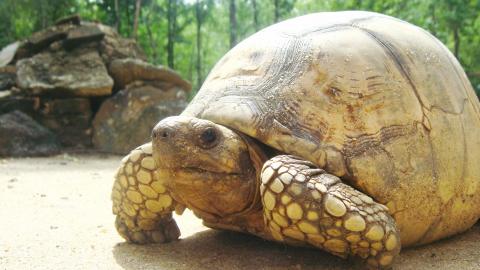The Taipei Zoo said it is working with global partners to prevent an endangered tortoise species from sharing the same fate as Lonesome George, the last of a subspecies of tortoise that died last week on June 24.
“Lonesome George is in the past now. The pressing issue is to prevent the tragedy from happening again to other tortoises threatened with extinction,” said Chang Ming-hsiung (張明雄), chief executive of the zoo’s Conservation and Research Center.
Lonesome George, a Pinta Island giant tortoise (Chelonoidis nigra abingdonii) that lived in the Galapagos Islands, died at the age of 100, prompting worldwide mourning over the beloved conservation icon.

Photo courtesy of Taipei Zoo
The subspecies is believed to have become extinct because Lonesome George, which had been kept in captivity in Galapagos National Park since the 1970s, failed to leave any offspring.
Although it caused consternation among conservationists, the tortoise’s demise may help other species survive.
It has prompted the Taipei Zoo to reflect on its conservation strategy for the endangered Burmese star tortoise. The zoo has 19 of the turtles, which were found in the 1990s in Taiwan after being illegally smuggled into the country for the pet or medicine markets.
That is 6.3 percent of the estimated global population of 300 for a species ranked 11th in the Turtle Conservation Coalition’s report last year entitled Turtles In Trouble: The World’s Top 25+ Endangered Tortoises and Freshwater Turtles.
Speaking at an international workshop the zoo held last week to discuss ways of restoring tortoise populations, Donal Boyer, curator of herpetology at the Bronx Zoo in New York, said the case of Lonesome George pointed to the need for conservationists to work more closely together to establish captive breeding programs.
Chang agreed, saying that a successful partnership would mean frequent exchanges of information on details such as the reptile’s habits and behavior as well as new high-tech breeding methods.
Chang cited as an example the time when the Taipei Zoo contacted the Behler Chelonian Conservation Center in California with the help of the Bronx Zoo in 2006 for advice on lifting the hatchling survival rate of its Burmese star tortoises.
As a result of the partnership, the survival rate improved from under 10 percent to 70 percent.
Another benefit of a strong network is the exchange of robust genetic diversity to increase the group’s chances for survival, said Gerald Kuchling, a conservationist at the University of West Australia.
Chang said these multinational efforts are aimed at creating “recovery houses” for the tortoises, natural sanctuaries that imitate the animal’s original habitat.
He said the Taipei Zoo’s next step would be to work with the Bronx Zoo-based Wildlife Conservation Society to prepare its Burmese star tortoises for reintroduction into such recovery houses in Myanmar next year.
However, the ultimate goal is to restore natural habitats so the creatures can be released into the wild.
“The Burmese star tortoises deserve to live in their original habitats in Myanmar,” Chang said. “They deserve to live in the wild instead of dying alone in zoos.”

Chinese Nationalist Party (KMT) Chairman Eric Chu (朱立倫), spokeswoman Yang Chih-yu (楊智伃) and Legislator Hsieh Lung-chieh (謝龍介) would be summoned by police for questioning for leading an illegal assembly on Thursday evening last week, Minister of the Interior Liu Shyh-fang (劉世芳) said today. The three KMT officials led an assembly outside the Taipei City Prosecutors’ Office, a restricted area where public assembly is not allowed, protesting the questioning of several KMT staff and searches of KMT headquarters and offices in a recall petition forgery case. Chu, Yang and Hsieh are all suspected of contravening the Assembly and Parade Act (集會遊行法) by holding

PRAISE: Japanese visitor Takashi Kubota said the Taiwanese temple architecture images showcased in the AI Art Gallery were the most impressive displays he saw Taiwan does not have an official pavilion at the World Expo in Osaka, Japan, because of its diplomatic predicament, but the government-backed Tech World pavilion is drawing interest with its unique recreations of works by Taiwanese artists. The pavilion features an artificial intelligence (AI)-based art gallery showcasing works of famous Taiwanese artists from the Japanese colonial period using innovative technologies. Among its main simulated displays are Eastern gouache paintings by Chen Chin (陳進), Lin Yu-shan (林玉山) and Kuo Hsueh-hu (郭雪湖), who were the three young Taiwanese painters selected for the East Asian Painting exhibition in 1927. Gouache is a water-based

Taiwan would welcome the return of Honduras as a diplomatic ally if its next president decides to make such a move, Minister of Foreign Affairs Lin Chia-lung (林佳龍) said yesterday. “Of course, we would welcome Honduras if they want to restore diplomatic ties with Taiwan after their elections,” Lin said at a meeting of the legislature’s Foreign Affairs and National Defense Committee, when asked to comment on statements made by two of the three Honduran presidential candidates during the presidential campaign in the Central American country. Taiwan is paying close attention to the region as a whole in the wake of a

OFF-TARGET: More than 30,000 participants were expected to take part in the Games next month, but only 6,550 foreign and 19,400 Taiwanese athletes have registered Taipei city councilors yesterday blasted the organizers of next month’s World Masters Games over sudden timetable and venue changes, which they said have caused thousands of participants to back out of the international sporting event, among other organizational issues. They also cited visa delays and political interference by China as reasons many foreign athletes are requesting refunds for the event, to be held from May 17 to 30. Jointly organized by the Taipei and New Taipei City governments, the games have been rocked by numerous controversies since preparations began in 2020. Taipei City Councilor Lin Yen-feng (林延鳳) said yesterday that new measures by